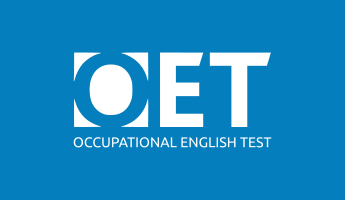Are you planning to come to Australia to undertake a degree in healthcare? Or, are you a recent graduate or professional looking for work in an English-speaking environment? There’s a good chance you’ll need to take an English test.
If you’re deciding between the multiple English tests available, you may be considering OET. OET is the English test for healthcare professionals who want to study or work in an English-speaking environment. Here are some of the benefits OET offers.
OET uses industry-specific language
Because OET is specifically designed for those working in or studying healthcare, it uses language unique to the industry. That means that by preparing for OET, you’ll be learning the right language to suit the job, and when you eventually start working, you’ll be better able to communicate with patients and colleagues.
OET prepares you for the job
OET incorporates healthcare scenarios that mirror real life. In the Speaking section, you may be asked to interact with a “patient” so you can demonstrate your verbal English skills. In the Writing section, you might have to prepare a discharge or referral letter in English. While you’re getting ready to take OET – and during the test itself – you’ll have the opportunity to build your practical skills so you can confidently enter the classroom or workforce and tackle real-world situations.
You’ll learn new customs and etiquette
You might already be familiar with the customs and etiquette associated with the healthcare industry in your home country. But, it’s likely you’ll face new ways of doing things in an English-speaking environment. For example, many English-speaking countries use patient-centred approaches to healthcare that involve actively listening to the patient. Here are the key differences between non-patient centred communication and patient-centred communication:
Non-patient centred communication incorporates closed questions such as “Have you taken any medication?” or “Is this the first time you’ve experienced these symptoms?” Because these are ‘yes’ or ‘no’ questions, they basically support the diagnosis already established by the doctor.
On the other hand, patient-centred communication uses open-ended questions where the patient can explain the situation themselves. Questions might include “Can you please describe the pain?” and “Can you please tell me which parts of your body hurt?” This way, the patient can provide more input to the doctor’s diagnosis, making them feel like they’re being properly listened to.
OET assesses your ability to perform patient-centred communication skills, such as active listening and helps prepare you for cultural shifts like this one. That means an easier transition when you start studying or working in English.
You can work in English-speaking countries all over the world
Taking OET could be the key to a global career, as healthcare regulators in several English-speaking environments recognise OET as proof of English. You could study or work in countries including Australia, the UK, Ireland, New Zealand, Dubai, Singapore and more, letting you explore the world and put your skills to good use.
“Yay, I have to take an English language test,” said nobody ever! With OET, you’ll be learning the kind of language you’ll need to succeed in your work or studies, without wasting your time on irrelevant topics. We can’t make studying for a test fun but we do make it worth your while!
Click HERE to start your international healthcare career today.







